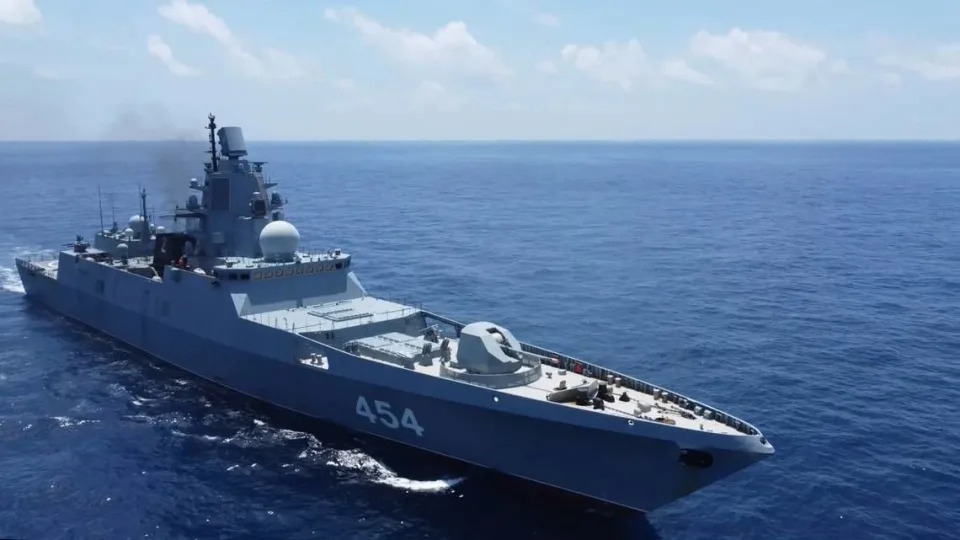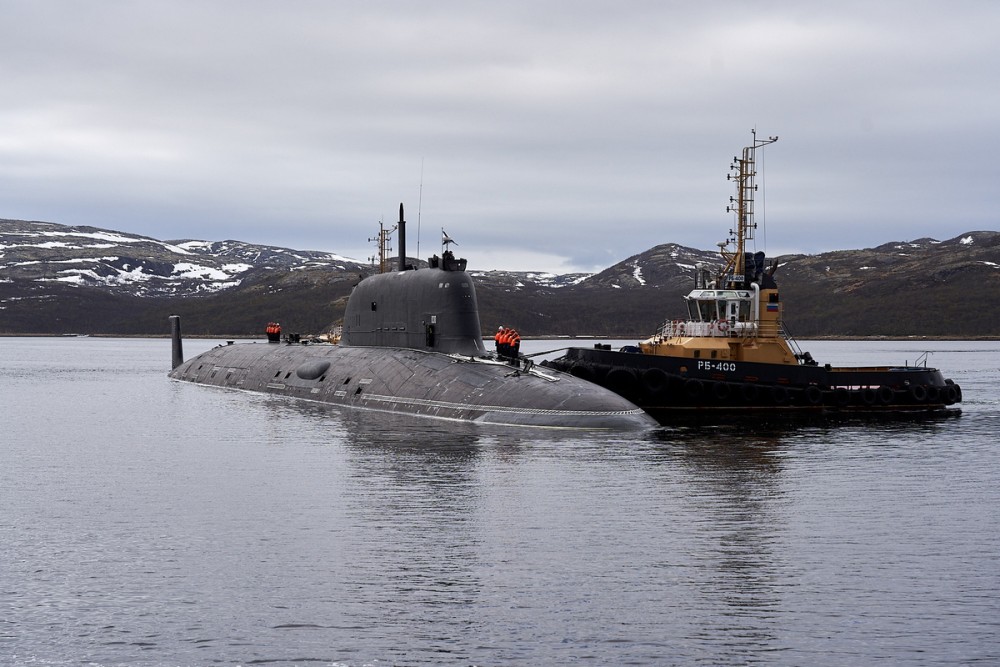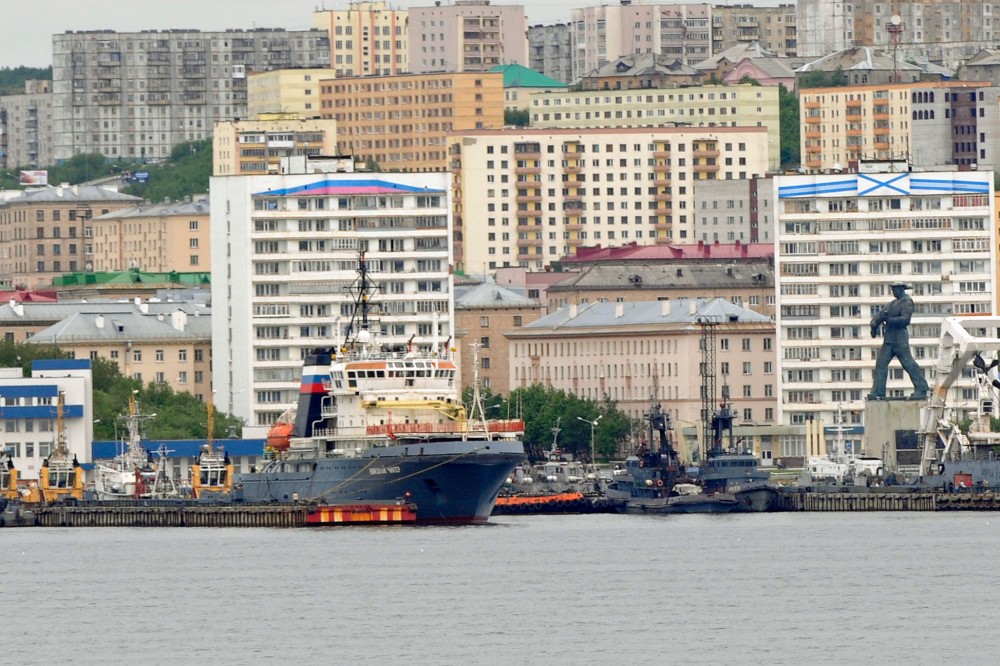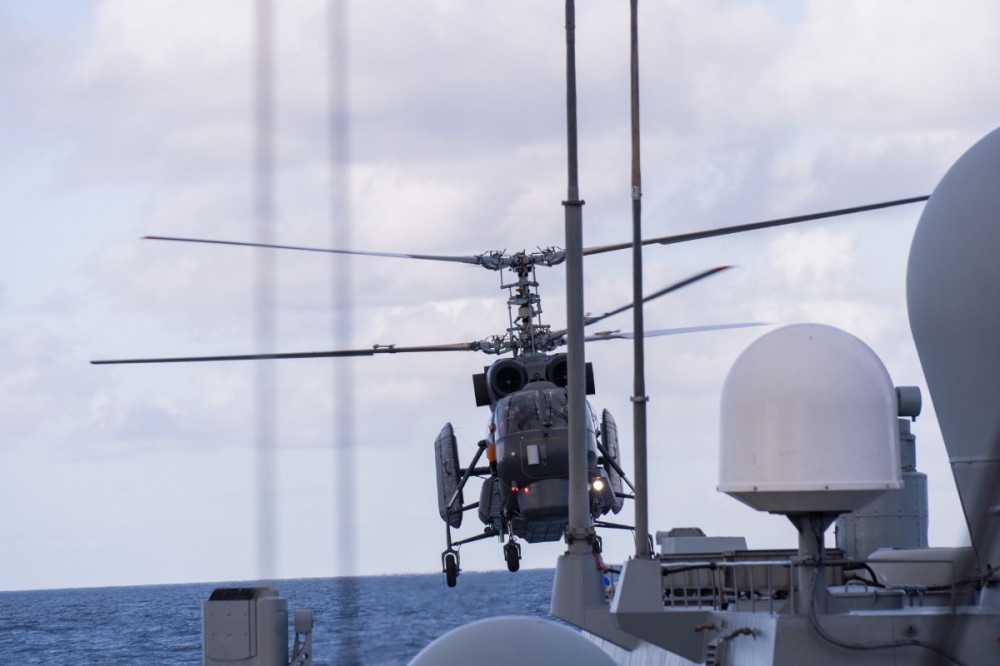Here’s a look at the nuclear sub, other Russian warships that will visit Cuba next week
IT'S SIXTIES FLASHBACK WEEK
Cuban authorities said that Moscow is also sending the Kazan, a Yasen-class nuclear-powered submarine, to Havana as part of the deployment.
Michael Wilner
Thu, June 6, 2024
The Cuban armed forces announced Thursday that Russia will dock three naval vessels and one nuclear-powered submarine at the port in Havana next week.
U.S. intelligence officials assess that none of the vessels will be carrying nuclear weapons, and the Biden administration is dismissing the Russian movements as a messaging ploy in response to U.S. assistance to Ukraine. But the deployment is expected to be part of a larger Russian military exercise in the Caribbean over the coming weeks, involving both warships and aircraft, that could be the most significant Russian activity in the region in at least five years.
Thu, June 6, 2024
The Cuban armed forces announced Thursday that Russia will dock three naval vessels and one nuclear-powered submarine at the port in Havana next week.
U.S. intelligence officials assess that none of the vessels will be carrying nuclear weapons, and the Biden administration is dismissing the Russian movements as a messaging ploy in response to U.S. assistance to Ukraine. But the deployment is expected to be part of a larger Russian military exercise in the Caribbean over the coming weeks, involving both warships and aircraft, that could be the most significant Russian activity in the region in at least five years.
What ships will Russia deploy to Cuba?
The main warship in the Russian deployment is the Admiral Gorshkov, a state-of-the-art frigate that is the lead ship in a new class of six combat vessels Moscow has commissioned through 2025.
Gorshkov-class ships can serve multiple roles for the Russian Navy, capable of performing anything from long-range attacks to escort missions or anti-submarine warfare — duties often reserved for destroyer-class ships. They are equipped with Russia’s most advanced weapons and sensor technology and can each carry a single attack helicopter on board.

APRIL 7, 2023: The Russian frigate Admiral Gorshkov holds exercises in the Red Sea. Russian Defence Ministry Press Office/TASS/Sipa USA
Just last month, a video shared on social media by the Russian Armed Forces showed a NATO reconnaissance aircraft in the crosshairs of Gorshkov’s crew in the North Atlantic.
The second Russian ship in the deployment is the Nikolay Chiker, a tug point and icebreaker that last year was tracked by British authorities while stalking critical oil and gas pipelines near the Scottish coastal region of Shetland.
The second ship, the Pashin, is an oil tanker that is part of the Russian Navy’s Arctic fleet.
What kind of submarine is involved?
Cuban authorities said that Moscow is also sending the Kazan, a Yasen-class nuclear-powered submarine, to Havana as part of the deployment.
The Kazan is said to be a state-of-the-art submarine, part of a new class of vessels intended to replace Russia’s aging Soviet-era nuclear submarines, that are capable of carrying and firing nuclear cruise missiles. On a routine basis, they are presumed to be carrying land-attack cruise missiles, anti-ship missiles, anti-submarine missiles, with a crew of up to 85 sailors.
In April, Russian-state media said the Kazan conducted a live-fire exercise, firing a conventional cruise missile at a coastal target in the Barents Sea.
Russian warships headed to Caribbean for drills as tensions rise over Ukraine, US officials say
TARA COPP
Wed, June 5, 2024 at 5:00 PM MDT·2 min read
WASHINGTON (AP) — The U.S. has been tracking Russian warships and aircraft that are expected to arrive in the Caribbean for a military exercise in the coming weeks, in a Russian show of force as tensions rise over Western military support for Ukraine, U.S. officials said Wednesday.
The ships also are expected possibly to make port calls in Venezuela and Cuba, as Russia establishes a Western Hemisphere military presence that the senior Biden administration officials said was notable but not concerning. The exercise, which will be monitored by the U.S. military, will involve a “handful” of Russian ships and support vessels, the two officials said.
It's not the first time Russia has sent its ships to the Caribbean. This exercise, however, is taking place as Russian President Vladimir Putin has suggested that Moscow could take “asymmetrical steps” elsewhere in the world in response to President Joe Biden's decision to allow Ukraine to use U.S.-provided weapons to strike inside Russia to protect Kharkiv, Ukraine's second-largest city.
The officials, who spoke to reporters on the condition of anonymity to provide details that had not been announced publicly, said the exercise is “certainly” part of a broader Russian response to the U.S. support for Ukraine, but it also is an effort by Putin to show his navy is still capable of global power projection after losing several ships to Ukrainian strikes.
Ukrainian military officials said in March that Russia had lost one-third of its Black Sea fleet to Ukrainian strikes during the past two years of war.
Russia did not notify the U.S. of the pending exercise, but the ships’ movements have been tracked by the U.S. Navy, the officials said.
Despite Russia not notifying the U.S. — which countries often do to avoid miscalculation — the officials said militaries all over the globe have the right to conduct exercises in international waters and do so regularly. For example, on Friday about 20 NATO countries including the U.S. will begin BALTOPS 24, a major naval and air exercise in the Baltic region near Russia.
The officials said they expect the Russian ships will remain in the region through the summer and will likely conduct similar, follow-up exercises in the Caribbean after this one concludes.
The officials said Congress was notified of the upcoming Russian exercises on Wednesday.
Northern Fleet’s nuclear sub 'Kazan' makes port call to Havana next week
The top-modern, heavily armed, submarine is part of a Russian naval detachment of four ships that will stay in port of the Cuban capital from June 12 to June 17.

The Kazan is based at Nerpichya in Zapadnaya Litsa a short 60 km east of Russia's border with Norway on the Barents Sea coast. Photo: Press service of the Northern Fleet
The top-modern, heavily armed, submarine is part of a Russian naval detachment of four ships that will stay in port of the Cuban capital from June 12 to June 17.

The Kazan is based at Nerpichya in Zapadnaya Litsa a short 60 km east of Russia's border with Norway on the Barents Sea coast. Photo: Press service of the Northern Fleet
THE BARENTS OBSERVER
June 06, 2024
“The visit corresponds to the historical friendly relations between Cuba and the Russian Federation,” a statement by Ministry of the Revolutionary Armed Forces reads.
The ministry finds reasons to underline that “none of the ships carry nuclear weapons.”
It was on May 17th the Northern Fleet detachment sailed out from the Kola Peninsula, heading for the North Atlantic. The three surface vessels in the group are the frigate Admiral Gorshkov, the oil tanker Pashin and the rescue tug Nikolai Chiker.

June 06, 2024
“The visit corresponds to the historical friendly relations between Cuba and the Russian Federation,” a statement by Ministry of the Revolutionary Armed Forces reads.
The ministry finds reasons to underline that “none of the ships carry nuclear weapons.”
It was on May 17th the Northern Fleet detachment sailed out from the Kola Peninsula, heading for the North Atlantic. The three surface vessels in the group are the frigate Admiral Gorshkov, the oil tanker Pashin and the rescue tug Nikolai Chiker.

Russian navy tug ” Nikolay Chiker” at port in Severomorsk, Kola Peninsula.
Photo: Thomas Nilsen
Somewhere outside the coast of Norway, the Admiral Gorshkov in exercise mode put an approaching NATO P-8 maritime patrol aircraft in gunsight, the Barents Observer reported.
The press service of the Northern Fleet this week posted another video from aboard the frigate, this time showing the crew launching a small quadcopter drone as target for artillery shooting.
The frigate carries a Ka-27M helicopter that at locations during the Atlantic voyage are training reconnaissance flights.

Somewhere outside the coast of Norway, the Admiral Gorshkov in exercise mode put an approaching NATO P-8 maritime patrol aircraft in gunsight, the Barents Observer reported.
The press service of the Northern Fleet this week posted another video from aboard the frigate, this time showing the crew launching a small quadcopter drone as target for artillery shooting.
The frigate carries a Ka-27M helicopter that at locations during the Atlantic voyage are training reconnaissance flights.

The Ka-27M helicopter operates out of the Admiral Gorshkov frigate. Here, somewhere in the North Atlantic this week. Photo: Information Service of the Northern Fleet
“The flights took place at a distance of up to 200 kilometers from the detachment of ships of the Northern Fleet and at altitudes of up to 1000 meters,” a Northern Fleet statement informs.
The Cuban Defense Ministry was first to announce the arrival of the Russian warships. By late Thursday, no official information is published by Russia’s Defense Ministry or the Northern Fleet about Havana as a first destination for the voyage that in May was said to last “for several months” on take place on “the world oceans.”
The Admiral Gorshkov is the lead vessel of Russia’s latest class of frigates. Commissioned in 2018, the warship can be armed with Tsirkon, Kalibr and Oniks cruise missiles, as well as Otvet anti-submarine missile.
Lead vessel of its class is also Kazan. The Yasen-M submarine was launched in 2017 and entered service with the Northern Fleet in 2021. This submarine can carry Oniks and Kalibr cruise missiles. The Defense Ministry in Moscow has previously said the Kazan will be armed with Tsirkon hypersonic missiles.
“The flights took place at a distance of up to 200 kilometers from the detachment of ships of the Northern Fleet and at altitudes of up to 1000 meters,” a Northern Fleet statement informs.
The Cuban Defense Ministry was first to announce the arrival of the Russian warships. By late Thursday, no official information is published by Russia’s Defense Ministry or the Northern Fleet about Havana as a first destination for the voyage that in May was said to last “for several months” on take place on “the world oceans.”
The Admiral Gorshkov is the lead vessel of Russia’s latest class of frigates. Commissioned in 2018, the warship can be armed with Tsirkon, Kalibr and Oniks cruise missiles, as well as Otvet anti-submarine missile.
Lead vessel of its class is also Kazan. The Yasen-M submarine was launched in 2017 and entered service with the Northern Fleet in 2021. This submarine can carry Oniks and Kalibr cruise missiles. The Defense Ministry in Moscow has previously said the Kazan will be armed with Tsirkon hypersonic missiles.
Russian warships headed to Caribbean for drills as tensions rise over Ukraine, US officials say
TARA COPP
Wed, June 5, 2024 at 5:00 PM
WASHINGTON (AP) — The U.S. has been tracking Russian warships and aircraft that are expected to arrive in the Caribbean for a military exercise in the coming weeks, in a Russian show of force as tensions rise over Western military support for Ukraine, U.S. officials said Wednesday.
The ships also are expected possibly to make port calls in Venezuela and Cuba, as Russia establishes a Western Hemisphere military presence that the senior Biden administration officials said was notable but not concerning. The exercise, which will be monitored by the U.S. military, will involve a “handful” of Russian ships and support vessels, the two officials said.
It's not the first time Russia has sent its ships to the Caribbean. This exercise, however, is taking place as Russian President Vladimir Putin has suggested that Moscow could take “asymmetrical steps” elsewhere in the world in response to President Joe Biden's decision to allow Ukraine to use U.S.-provided weapons to strike inside Russia to protect Kharkiv, Ukraine's second-largest city.
The officials, who spoke to reporters on the condition of anonymity to provide details that had not been announced publicly, said the exercise is “certainly” part of a broader Russian response to the U.S. support for Ukraine, but it also is an effort by Putin to show his navy is still capable of global power projection after losing several ships to Ukrainian strikes.
Ukrainian military officials said in March that Russia had lost one-third of its Black Sea fleet to Ukrainian strikes during the past two years of war.
Russia did not notify the U.S. of the pending exercise, but the ships’ movements have been tracked by the U.S. Navy, the officials said.
Despite Russia not notifying the U.S. — which countries often do to avoid miscalculation — the officials said militaries all over the globe have the right to conduct exercises in international waters and do so regularly. For example, on Friday about 20 NATO countries including the U.S. will begin BALTOPS 24, a major naval and air exercise in the Baltic region near Russia.
The officials said they expect the Russian ships will remain in the region through the summer and will likely conduct similar, follow-up exercises in the Caribbean after this one concludes.
The officials said Congress was notified of the upcoming Russian exercises on Wednesday.
TARA COPP
Wed, June 5, 2024 at 5:00 PM
WASHINGTON (AP) — The U.S. has been tracking Russian warships and aircraft that are expected to arrive in the Caribbean for a military exercise in the coming weeks, in a Russian show of force as tensions rise over Western military support for Ukraine, U.S. officials said Wednesday.
The ships also are expected possibly to make port calls in Venezuela and Cuba, as Russia establishes a Western Hemisphere military presence that the senior Biden administration officials said was notable but not concerning. The exercise, which will be monitored by the U.S. military, will involve a “handful” of Russian ships and support vessels, the two officials said.
It's not the first time Russia has sent its ships to the Caribbean. This exercise, however, is taking place as Russian President Vladimir Putin has suggested that Moscow could take “asymmetrical steps” elsewhere in the world in response to President Joe Biden's decision to allow Ukraine to use U.S.-provided weapons to strike inside Russia to protect Kharkiv, Ukraine's second-largest city.
The officials, who spoke to reporters on the condition of anonymity to provide details that had not been announced publicly, said the exercise is “certainly” part of a broader Russian response to the U.S. support for Ukraine, but it also is an effort by Putin to show his navy is still capable of global power projection after losing several ships to Ukrainian strikes.
Ukrainian military officials said in March that Russia had lost one-third of its Black Sea fleet to Ukrainian strikes during the past two years of war.
Russia did not notify the U.S. of the pending exercise, but the ships’ movements have been tracked by the U.S. Navy, the officials said.
Despite Russia not notifying the U.S. — which countries often do to avoid miscalculation — the officials said militaries all over the globe have the right to conduct exercises in international waters and do so regularly. For example, on Friday about 20 NATO countries including the U.S. will begin BALTOPS 24, a major naval and air exercise in the Baltic region near Russia.
The officials said they expect the Russian ships will remain in the region through the summer and will likely conduct similar, follow-up exercises in the Caribbean after this one concludes.
The officials said Congress was notified of the upcoming Russian exercises on Wednesday.

No comments:
Post a Comment